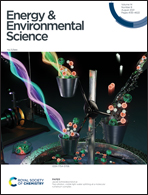Marginal energy intensity of water supply†
Abstract
Reducing global carbon emissions will require diverse industrial sectors to use energy more efficiently, electrify, and operate intermittently. The water sector is a transformation target, but we lack high-resolution energy quantification tools to guide operational, infrastructure, and policy interventions in complex water sourcing, treatment, and distribution networks. We propose that the marginal energy intensity (MEI) of water supply be used to quantify the location-specific, instantaneous embedded energy in water delivered to consumers. We describe a rigorous computational framework for computing MEI and elucidate the sensitivity of MEI to generalizable water system features using two representative water supply systems. When incorporated in multi-objective operational and planning models, MEI will serve as a robust and informative metric for guiding optimal implementation of water efficiency, conservation, and retrofit programs.



 Please wait while we load your content...
Please wait while we load your content...